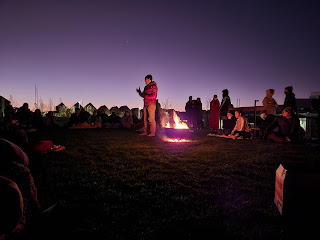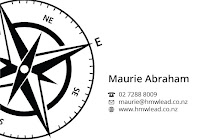I don't know why I was a bit nervous prior to our ERO visit near the end of last year. I think it was down to me not being confident that a team of people with little knowledge of what we were trying to do would be able to "get us". Would they be able to accept that there's more than one way to skin the NZC cat? Would they really understand our determination to broaden the definition of success for a school well beyond academic measures?
At their final meeting with us they stated that when they first arrived and met with us they struggled with the seeming complexity of our approach but that they very quickly realised there was a strong thread of coherence and cohesion throughout; that all participants in our school were strongly aware of the key frameworks that supported our learning design and our pedagogy. They referred to what they called our 'Founding Documents' as underpinning and driving learning design at our school. After seeking clarification from them we realised that they meant the Vision, Pathways of Excellence, Mission, Principles, Values and Dispositions, which are perpetually visible throughout our school (both on walls and embedded within planning documents and a wide range of templates).
It was hugely affirming to be told that these key frameworks, which we had all help create and to which we are all committed, were clearly the drivers of effective innovation at our school.
See our ERO Report here.
 |
| HPSS 'Founding Documents' |
Our Vision
Like a lot of statements like this it could also be seen as just a bunch of words with little actual meaning and I agree that you have to work hard to ensure such statements are continually brought to life in a school. I love this statement because the last bit describes the graduate we wish to aspire to. For us to achieve our vision we need to develop and support young people to be true life-long learners and who have the dispositions and skills to make the world a better place and to thrive in the rapidly changing environment ("to contribute confidently and responsibly in our changing world.")
Two Pathways to Excellence
As soon as we commit to the above vision we need to move beyond just academic excellence as our sole major focus. The best academic students in the country would not help us achieve our vision if they did not know how to, or even want to, contribute to a world in which everyone of us can thrive. This is why, early on, we settled on 2 Pathways to Excellence.
While there exists some strong frameworks for Academic Excellence (NZC and NCEA), we could not discover any such frameworks for what we meant by Personal Excellence.We have spent 7 years progressing this work and, while we still have much to do, we are proud of the work we have done so far in building these frameworks.
I used to profess that the development in the areas of Personal Excellence was as important as in the areas of Academic Excellence. I now firmly believe that they are more important.
Hobsonville Habits
We settled on the above 10 dispositions, known as the Hobsonville Habits, to be the core elements of Personal Excellence in much the same way Learning Areas are the core elements of Academic Excellence.
It is our view that if young people are strong in these dispositions, as well as developing their Academic Excellence, then they are more likely to be empowered learners who "contribute confidently and responsibly in a changing world."
To be true to this aspiration we have been determined to devote the same commitment and rigour to the exploration of each of these dispositions as we do to the Learning Areas of the NZC.
Mission and Principles
We have also worked hard to bring our Mission Statement Innovate Engage Inspire to life as well, as we didn't want it to be just a collection of words that fade into the background. We did this by fleshing them out to a set of Principles; principles that drive all decision-making in our school.
For a secondary school, which is largely a one-size-fits-all, to always be looking to personalise learning then, in our view, that would be innovative. So we continually test that aspect of our Mission by checking how personalised learning is.
As well, we believe that students become more engaged if their learning is as authentic, to them, as possible. We find a great way to do this is to continually seek partners beyond the school for students to connect their learning with. I have certainly seen levels of engagement and accountability rise when others, in the real world, are relying on learners for their learning.
In reflecting on the 3rd aspect of our Mission, Inspire, it wasn't difficult to flesh that out into the principle of deep challenge and inquiry. In my 39 years in the profession I haven't seen many young people truly inspired by surface learning and chasing credits. However, every young person I have come across has been truly inspired when they have the opportunity, and the skills, to delve deeply into issues of relevance and concern to them.
Values
Once you pronounce a set of Values it is vital that they become the most important thing you focus on as you are declaring them to be the most valuable thing. Too often institutions profess a set of values that are not evident in the operation of that institution. We were and are determined to keep our values at front and centre.

Because we say we value these we have included them in some key elements of our school. First of all, they are the means by which we assess our Big and Impact Projects. We have developed rubrics for students and teachers to use to see how strongly the values are developed in their project learning. Secondly, the top level of awards at our annual prizegiving are awarded to those who have developed these values the most throughout the year. And thirdly, in the development of our Graduate Profile we have decided that our Values will be the key elements of that Profile.
 |
| Our current work on Graduate Profile with Values at the centre |
And of course none of this is rocket science. Research around effective schools and effective leadership talks about the importance of a strong, clear and shared vision. Bit it's been real affirming to see that the elements captured in the first visual are driving the innovation at our school and resulting in a strong and effective learning and teaching environment.
Where, I think, our school has been quite unique is with our strong focus on the dispositional curriculum (Hobsonville Habits) and our Values. Our experience has convinced me that if our graduates develop strength in our Habits and Values then the Academics largely look after themselves.
I hope this is useful in your thinking about how to drive innovation and disruption in your own setting.





















